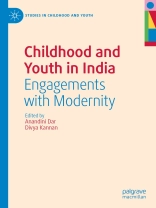This edited volume advances the conceptual framework of the ‘everyday urban’ to unpack the ways in which processes of modernity in India shape young subjects and, in so doing, centers the analytical categories of childhood and youth. In rejecting simplistic binaries of agency, and teleological logics of development and modernity, the authors focus on the complex pathways of negotiation and conflict that mark the lives of young people across various historical and contemporary contexts in urban India. Chapters are organized across two key themes: Shaping Modern Subjects and Being Modern Subjects, while spanning multiple disciplines including anthropology, history, sociology, disability studies, and psychology. Together, the contributions aim to advance the field of childhood and youth studies in South Asia and beyond.
Table des matières
1. Introduction: Children, Youth, and Modernity in the ‘Everyday Urban’.- Part I: Shaping Modern Subjects.- 2. Development Discourses and Psychosocial Interventions: The Discursive Construction Of ‘Risky’ and ‘Resilient’ Childhoods and Youth.- 3. Conceptualisation of Development and Learning in Indian Early Childhood Curriculum.- 4. Mediated Childhoods: Newspapers and the Modern Malayali Child.- 5. Clean Bodies in School Uniform: Childhood and media discourses of cleanliness in Tamil Nadu, India.- 6. The Trumpet and the Drum: Music and Reclaiming the Delinquent Child.- 7. Identifying Child Labor: Revisiting State’s Craft in Bombay Textile Mills (1880-1920).- Part II: Being Modern Subjects.- 8. Examining Shifting Us-Them Binaries: The Experiences of Disabled Children in After-School Programs in Delhi.- 9. “Youth Must Keep ‘Upvaluing’ Themselves: Personality Development and Modern Selves in Contemporary Delhi.- 10. ‘Nobody wants to be the behenji-type’: Young People Managing Romance, Work and Violence in the Urban Slums of Kolkata.- 11. Producing modern subjects of change: reeducation and empowerment for migrant working children in Bangalore.- 12. Schooling, Family Life, and Modernity: Examining the ‘everyday’ experiences of elite adolescents in India.
A propos de l’auteur
Anandini Dar Anandini Dar is associate professor in School of Liberal Studies, BML Munjal University, India.
Divya Kannan is Assistant Professor in the Department of History and Archaeology at Shiv Nadar Institution of Eminence, India.












